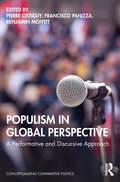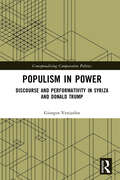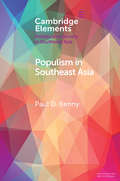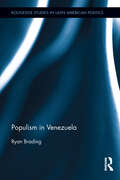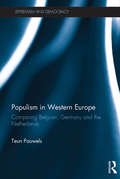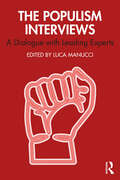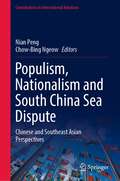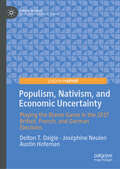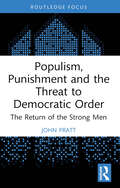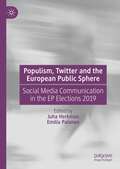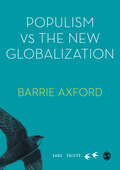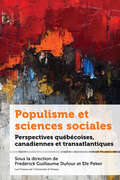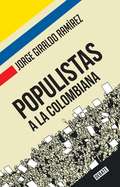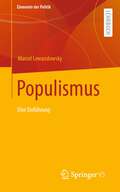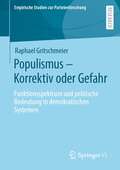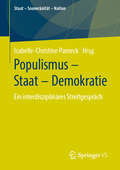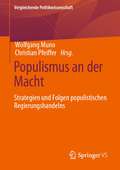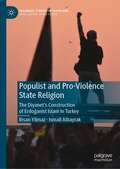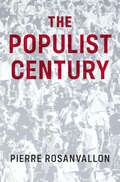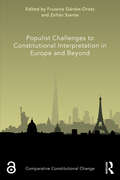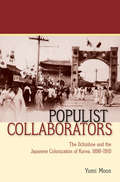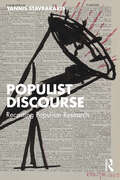- Table View
- List View
Populism in Europe and the Americas
by Cas Mudde Cristóbal Rovira KaltwasserAlthough 'populism' has become something of a buzzword in discussions about politics, it tends to be studied by country or region. This is the first book to offer a genuine cross-regional perspective on populism and its impact on democracy. By analyzing current experiences of populism in Europe and the Americas, this edited volume convincingly demonstrates that populism can be both a threat and a corrective to democracy. The contributors also demonstrate the interesting similarities between right-wing and left-wing populism: both types of populism are prone to defend a political model that is not against democracy per se, but rather at odds with liberal democracy. Populism in Europe and the Americas offers new insights into the current state of democracy from both a theoretical and an empirical point of view.
Populism in Global Perspective: A Performative and Discursive Approach (Conceptualising Comparative Politics)
by Pierre Ostiguy Francisco Panizza Benjamin MoffittPathbreaking theoretically and innovative in treatment, Populism in Global Perspective is a seminal addition to the literature on arguably the most controversial and fervently discussed topic in political science today. The book brings together established and rising stars in the field of populism studies, in an integrated set of theoretical and empirical studies centered on a discursive-performative notion of populism. Contributors argue that populist identification is relational and sociocultural, and demonstrate the importance of studying populism phenomenologically together with anti-populism. The truly global series of case studies of populism in the US, Western and Southern Europe, Latin America, South Africa, the Philippines, and Turkey achieves a deliberate balance of left and right instances of populism, including within regions, and of populism in government and opposition. Written in a style approachable to students and specialists alike, the volume provides a substantial foundation for current knowledge on the topic. Populism in Global Perspective is a must read for comparativists, political theorists, sociologists, area studies specialists, and all educated readers interested in populism worldwide.
Populism in Power: Discourse and Performativity in SYRIZA and Donald Trump (Conceptualising Comparative Politics)
by Giorgos VenizelosShifting attention away from policy achievements and effects on democracy, this book focuses on the charismatic function of populist discourse – comprising antagonistic narratives, transgressive style and appeals to the common people. The book puts forward an integrative approach that brings together discourse analysis, analysis of digital media, in-depth interviews and ethnographic methods, and places into comparative perspective the cases of SYRIZA in Greece and Donald Trump in the United States. Theorising populism through the lens of collective identification, Venizelos places the rhetorical and emotional dynamics of populist performativity at the core of the analysis, offering a rigorous yet flexible conceptulisation of populism in power. Against theoretical expectations, findings suggest that both SYRIZA and Trump retained, to different degrees, their populist character in power, although their style and vision differed vastly. This book urges researchers, journalists and politicians to adopt a reflexive approach to analysing the political implications of populism for politics, polity and society, and to challenge the normatively charged definitions that are uncritically reproduced in the public sphere. It will appeal to researchers of political theory, populism, comparative politics, sociologists and ethnographers.
Populism in Power: Discourse and Performativity in SYRIZA and Donald Trump (Conceptualising Comparative Politics)
by Giorgos VenizelosShifting attention away from policy achievements and effects on democracy, this book focuses on the charismatic function of populist discourse – comprising antagonistic narratives, transgressive style and appeals to the common people.The book puts forward an integrative approach that brings together discourse analysis, analysis of digital media, in-depth interviews and ethnographic methods, and places into comparative perspective the cases of SYRIZA in Greece and Donald Trump in the United States. Theorising populism through the lens of collective identification, Venizelos places the rhetorical and emotional dynamics of populist performativity at the core of the analysis, offering a rigorous yet flexible conceptulisation of populism in power. Against theoretical expectations, findings suggest that both SYRIZA and Trump retained, to different degrees, their populist character in power, although their style and vision differed vastly.This book urges researchers, journalists and politicians to adopt a reflexive approach to analysing the political implications of populism for politics, polity and society, and to challenge the normatively charged definitions that are uncritically reproduced in the public sphere. It will appeal to researchers of political theory, populism, comparative politics, sociologists and ethnographers.
Populism in Southeast Asia (Elements in Politics and Society in Southeast Asia)
by Paul D. KennyThis Element is organized around two questions: What does populism mean in the context of Southeast Asia? And what are the causes of populist success in the region? Populism is conceived of as political strategy through which charismatic leaders establish unmediated links with otherwise unattached mass constituencies in their quest to gain and retain power. Having identified all of the cases of populism in Southeast Asia's democracies, the main argument put forward is that populist mobilization thrives in the region because parties are so weak. This weakness is in turn is caused by institutional and political economic factors.
Populism in Venezuela (Routledge Studies in Latin American Politics)
by Ryan BradingPopulism in Venezuela analyses the emergence, formation, reproduction and resistance to a left-wing populist project in a major world oil producer. For readers who seek to understand the historical, economical and sociological contexts that gave rise to a 38 year-old mestizo-mulato Lieutenant Colonel who stormed the presidential palace in a bloody coup d’état in 1992, subsequently returned to the same palace in 1998, but this time, as a democratically elected President, and has been in power since, this book is the right place to start. In spite of opposition attempts to oust President Hugo Chávez and his political machinery from power, this ‘socialism of the twenty-first century’ hegemonic project has succeeded in creating an institutional structure designed to improve the lives of the previously excluded population. An in-depth fieldwork study of a Cuban healthcare programme named Barrio Adentro (deep in the slums) in Venezuela’s poor and rural areas, and the nonviolence Manos Blancas (white hands) opposition student movement - provides a descriptive and analytical account of people’s problems from both sides in a deeply polarised society. The concluding chapter of this book examines Chávez’s intention to stay in power until 2031. An original resource for scholars, students and general readers; this book not only furthers our understanding populism in Venezuela but also provides a sound method to analyse populist practices in other contexts.
Populism in Western Europe: Comparing Belgium, Germany and The Netherlands (Extremism and Democracy)
by Teun PauwelsDespite the increasing academic interest in populism, we still lack understanding of individual factors contributing to populist voting. One of the main reasons for this is that populism is almost always attached to other ideologies which makes it difficult to isolate factors. This book draws on an innovative research design by comparing the reasons to vote for six populist parties which differ remarkably in terms of their host ideology in Belgium, The Netherlands, and Germany. The results show that populist voters are motivated by their dissatisfaction with the functioning of democracy and a desire for more direct democracy. Furthermore it appears that populist parties do not mobilize among one specific social group although deprived groups are generally more susceptible to populist voting. Finally, this study explored why some populist parties persist while others decline. Origins of party formation and how leaders organize their party internally seem the most important factors determining party persistence. This book will be of great interest to students and scholars of populism, European politics and contemporary political theory.
The Populism Interviews: A Dialogue with Leading Experts
by Luca ManucciThe Populism Interviews features interviews with many of the leading experts on this most controversial of issues. Populism is a widely debated topic, and it generates interest across the globe. As a result, a burgeoning literature deals with many aspects of populism and its links to pressing issues such as media freedom, minority rights and separation of powers. To make sense of such a complex subject, this book presents interviews with some of the leading experts on populism at the international level. Through a dialogue with important figures, this book offers the possibility to make sense of a global phenomenon in a complete and accessible way. The first section presents different theories on what populism is and is not, highlighting the differences but also the points of contact between different approaches. The second part offers an overview of the evolution of populism through history and across continents, detailing its causes and consequences. The third part deals with issues and topics connected to populism, such as environmentalism, welfare, religion, social movements and the media. Bridging theoretical approaches and empirical studies, while considering cases across space and over time, this book offers an insightful and accessible guide to the study of populism. This volume will be of interest to all scholars, students and researchers of populism.
Populism, Nationalism and South China Sea Dispute: Chinese and Southeast Asian Perspectives (Contributions to International Relations)
by Nian Peng Chow-Bing NgeowThis book analyzes two main trends of prevailing populism and nationalism in China and Southeast Asian nations and rising tensions in the South China Sea (SCS) by experts from China and Southeast Asia. The book involves the most recent developments and indicates future trends. This is the first book which goes deeply into the SCS dispute from the perspectives on populism and nationalism and thus highlighting their significance in Asian politics. The broad approach adopted in the book with focus on all important countries expands the scope of readership beyond specific academic community. The book interests academics, policy makers, journalists, general reader, and students of Asian politics. The main body of this book is divided into 8 parts, in which the first section briefly introduces the aims and scope of this book. The following 7 parts look at the new development of populism and nationalism in China and ASEAN claimant states and some important non-claimant states mainly including the Philippines, Vietnam, Malaysia, Indonesia, Singapore, Cambodia, and its multiple effects on the SCS dispute.
Populism, Nativism, and Economic Uncertainty: Playing the Blame Game in the 2017 British, French, and German Elections (Europe in Crisis)
by Delton T. Daigle Joséphine Neulen Austin HofemanThis project offers an in-depth look at the three 2017 elections held in Western Europe: France, Germany, and the UK. With events like Brexit and a general rise in right-wing populism across highly industrialized nations, understanding the underlying causes of increasingly extreme electoral behavior is both valuable and prescient. A highly theoretically-focused and current project, it provides a consistent methodological and analytic approach that uses election study data and primary sources to offer a complete and cogent picture of this complex phenomenon as can only found by examining the attitudes and behaviors of the most powerful of democratic participants: the voters.
Populism, Punishment and the Threat to Democratic Order: The Return of the Strong Men (Routledge Studies in Crime and Society)
by John PrattThis book traces the rise of contemporary populism in Western democracies, marked by the return of would-be 'strong men' politicians. It seeks to make sense of the resultant nature, origins, and consequences —as expressed, for example, in the startling rise of the social movement surrounding Trump in the US, Brexit in the UK and the remarkable spread of ideologies that express resistance to "facts," science, and expertise. Uniquely, the book shows how what began as a form of penal populism in the early 1990s transformed into a more wide ranging populist politics with the potential to undermine or even overthrow the democratic order altogether; examines the way in which the Covid-19 pandemic has impacted on these forces, arguing it threw the flailing democratic order an important lifeline, as Vladimir Putin has subsequently done with his war in Ukraine. The book argues that contemporary political populism can be seen as a wider manifestation of the earlier tropes and appeal of penal populism arising under neo-liberalism. The author traces this cross over and the roots of discontent, anxiety, anti-elites sentiment and the sense of being forgotten, that lie at the heart of populism, along with its effects in terms of climate denial, ‘fake news’, othering, nativism and the denigration of scientific and other forms of expertise. In a highly topical and important extension to the field the author suggests that the current covid pandemic might prove to be an ‘antidote’ to populism, providing the conditions in which scientific and medical expertise, truth telling, government intervention in the economy and in health policy, and social solidarity, are revalorised. Encompassing numerous subject areas and crossing many conventional disciplinary boundaries, this book will be of great interest to students and scholars of criminology and criminal justice, sociology, political science, law, and public policy.
Populism, Twitter and the European Public Sphere: Social Media Communication in the EP Elections 2019
by Juha Herkman Emilia PalonenThis volume approaches the relationship between European public sphere and political communication in the framework of establishing populism and social media. The empirical analysis focuses on the comparison between different EU countries during the 2019 EP elections campaign. The data for the analysis was collected real time from Twitter in the Netherlands, Germany, Finland, Italy, Spain, Ireland and the UK. during a month period and are analyzed with both computerized quantitative and manual qualitative methods.The book introduces a new perspective in conceptualizing populism in comparative analysis, in which populism is understood rather as an antagonist logic of political identity formation than pre-defined political ideologies, movements or party cleavages. We approach implications of populist construction of ‘us’ and ‘not us’ in national contexts of 2019 EP election campaigns to find out the relationality between different political actors and parties. A special attention is paid to national/transnational and European/Eurosceptic tendencies in campaign rhetoric. By using a unique idea of ‘hashtag publics’ we approach the common Twitter discussions around the elections and ask: what particular topics and themes did different political actors distribute over Twitter during the 2019 EP elections, how were various topics and actors linked to each other, and how were campaign agendas and actors linked to populism?Chapter-No.1,Chapter-No.4 and Chapter-No. 8 are available open access under a Creative Commons Attribution 4.0 International License via link.springer.com.
Populism Versus the New Globalization (SAGE Swifts)
by Barrie AxfordPopulism and globalization are shorthand for the temper of our times. Populism is usually cast as globalization’s nemesis, a backlash against worldwide connectivity, while globalization is often said to be in retreat or even demise. This book takes issue with both interpretations, claiming instead that while populism of all shades tends to be anti-globalist, the globalism it is pitted against has changed dramatically in recent years and is increasingly decentred, destabilized, contingent, multipolar, and multidirectional. Axford paints a picture of this new globalization and dissects the strains of postmodern populism that both contest it and are its expression. Attention to the current surge of populism also affords purchase on an axial feature of our turbulent and globalized world—the imbrication or antithesis of local and global, of difference and sameness. This is an interdisciplinary examination of populism as a factor in global change, drawing on international politics, sociology, and global studies.
Populism Versus the New Globalization (SAGE Swifts)
by Barrie AxfordPopulism and globalization are shorthand for the temper of our times. Populism is usually cast as globalization’s nemesis, a backlash against worldwide connectivity, while globalization is often said to be in retreat or even demise. This book takes issue with both interpretations, claiming instead that while populism of all shades tends to be anti-globalist, the globalism it is pitted against has changed dramatically in recent years and is increasingly decentred, destabilized, contingent, multipolar, and multidirectional. Axford paints a picture of this new globalization and dissects the strains of postmodern populism that both contest it and are its expression. Attention to the current surge of populism also affords purchase on an axial feature of our turbulent and globalized world—the imbrication or antithesis of local and global, of difference and sameness. This is an interdisciplinary examination of populism as a factor in global change, drawing on international politics, sociology, and global studies.
Populisme et sciences sociales: Perspectives québécoises, canadiennes et transatlantiques (Politique et politiques publiques)
by Victor Armony Geneviève Tellier Olivier Audet Olivier Bélanger-Duchesneau Olivier Bérubé-Sasseville Joanie Bouchard Stéphanie Chouinard Sylvain Crépon Allison Harell Isabel L. Krakoff Emily Laxer Mathieu Lizotte Djamila Mones Sébastien Mosbah-Natanson Anke Patzelt Derek J. Robey François Tanguay Annie Verreault Elke WinterLe populisme n’a jamais été aussi populaire en tant que concept, tant dans les débats académiques que publics. Il est une des réalités politiques, en particulier dans sa variété de droite, qui a suscité à la fois la plus grande surprise par son ampleur et le plus de questionnements sur sa nature depuis le Brexit et l’élection présidentielle de Donald Trump en 2016. Au Canada, l’actualité politique depuis la COVID-19 semble donner raison à la thèse voulant que ce pays ne soit pas une exception à la vague populiste globale. Dans ce nouveau contexte politique, il devient crucial d’approfondir notre compréhension du populisme à l'aide des outils analytiques des sciences sociales, ce que propose ce volume édité. Populisme et sciences sociales offre des contributions théoriques, empiriques et multidisciplinaires à l’étude de l'un des phénomènes les plus marquants du XXIe siècle.
Populismo en Colombia
by Jorge Giraldo RamirezUn completo estudio sobre el populismo en Colombia y sus consecuencias. <P><P>El populismo reverdece en el mundo. Crece allí donde las instituciones democráticas y liberales fallan. Se nutre del inconformismo y se extiende como una incitación a salidas desesperadas. <P> Pero, a pesar de ser un término de uso frecuente la noción misma de populismo se ha oscurecido en manos de la especulación, la falta de contexto histórico y la ausencia de estudios locales. <P>Populistas a la colombiana busca llenar ese vacío en momentos en que el país, en medio de la contienda electoral que sigue a los acuerdos de La Habana, asiste a la recomposición de su mapa político y el surgimiento de nuevos líderes. <P>En conjunto, el libro reconstruye el origen y sentidos del populismo, sus versiones regionales, los contradictores que han colaborado en su definición y describe las formas que adoptó en Colombia, en tres casos significativos: Jorge Eliécer Gaitán, Gustavo Rojas Pinilla y Álvaro Uribe, y otros menos representativos, como Gustavo Petro. <P> De cierre, Jorge Giraldo Ramírez reflexiona, muy a propósito de la actual coyuntura, sobre la probabilidad de otro otro populismo en Colombia.
Populismus: Eine Einführung (Elemente der Politik)
by Marcel LewandowskyDas Lehrbuch bietet eine einführende Darstellung des Populismus in allen relevanten Facetten. Namentlich adressiert das Buch seine unterschiedlichen Manifestationen (als Ideologie, Parteiprogramm und individuelle Einstellung), stellt den Populismus in vergleichender Perspektive vor und analysiert die Ursachen für den Wahlerfolg populistischer Parteien. Ferner diskutiert das Buch die Auswirkungen populistischer Parteien auf die Demokratie und den Parteienwettbewerb.
Populismus – Korrektiv oder Gefahr: Funktionsspektrum und politische Bedeutung in demokratischen Systemen (Empirische Studien zur Parteienforschung)
by Raphael GritschmeierIn der öffentlichen Diskussion stellt Populismus vor allem im europäischen Raum einen negativ konnotierten Begriff dar. Meist werden populistische Parteien als Gefahr für die liberale Demokratie, ihre Institutionen und Garantien betrachtet. Die Forschung schreibt ihnen jedoch bereits seit längerem eine potenzielle Wirkung als Korrektiv zu. Diese Ausgangslage nimmt die vorliegende Studie zum Anlass, die beiden Wirkperspektiven (Korrektiv/Gefahr) zu systematisieren und mithilfe von jeweils vier zugehörigen Funktionen auszudifferenzieren. Dieses theoretisch ausbuchstabierte Funktionstableau wird anhand der rechtspopulistischen Fallbeispiele Alternative für Deutschland (AfD) und Freiheitliche Partei Österreichs (FPÖ) empirisch geprüft. Ausgehend von der hohen Kontextaffinität von (Rechts-)Populismus steht die Frage im Mittelpunkt, welche Funktionen (rechts-)populistische Akteure innerhalb der liberal-demokratischen Ordnung übernehmen und unter welchen Kontextbedingungen sie diese aus- und erfüllen können.
Populismus – Staat – Demokratie: Ein interdisziplinäres Streitgespräch (Staat – Souveränität – Nation)
by Isabelle-Christine PanreckZwar fällt die Populismusforschung auf den ersten Blick ins Kerngebiet der Politikwissenschaft, aber keine Geistes- oder Sozialwissenschaft verschließt sich der Debatte. Dabei erfolgt eine interdisziplinäre Verknüpfung der einzelnen Diskussionsfäden bislang nur vereinzelt. Der Sammelband stößt in die Lücke, indem er erstmals Vertreterinnen und Vertreter der Kunst-geschichte, Ökonomie, Philosophie, Politikwissenschaft, Politolinguistik, Städtebau/Architektur und Theologie zum Streitgespräch versammelt.
Populismus an der Macht: Strategien und Folgen populistischen Regierungshandelns (Vergleichende Politikwissenschaft)
by Wolfgang Muno Christian PfeifferPopulisten wie Donald Trump, Viktor Orbán oder Jair Bolsonaro verändern die Weltpolitik und stellen etablierte institutionelle Verfahrensweisen in Frage. Der Sammelband betrachtet die Regierungsführung populistischer Akteure und gibt einen Einblick in politische Strategien und Folgen des Handelns von Populisten an der Macht. Die leitende Fragestellung ist, wie es Populismus mit der Demokratie hält: Wirkt er sich ausschließlich negativ auf die Qualität einer Demokratie aus oder gibt es auch Anzeichen einer positiven Wirkung von Populismus im Sinne eines Korrektivs vermeintlicher Fehlentwicklungen? Wann hört populistisches Regieren auf und wann fängt autokratisches Regieren an? Die Substanz von Populismus zeigt sich letztlich an der Macht.Der vorliegende Sammelband verfolgt das Ziel, sich dieser Demokratiefrage empirisch zu nähern. Neben quantitativ-vergleichenden Beiträgen zu Auswirkungen auf die Demokratiequalität und zu anti-muslimischen Einstellungen werden populistische Mechanismen und Praktiken in Ländern wie Indien, den USA, Venezuela, Argentinien, Brasilien, Österreich, Spanien, Polen, Ungarn, Bulgarien, Rumänien sowie Österreich analysiert. Das Interesse liegt insbesondere auf der Entwicklung der Regime- bzw. Demokratiequalität und der Variation von Art und Wirkung populistischer Herrschaft in unterschiedlichen Kontexten und verschiedenen Weltregionen.
Populist and Pro-Violence State Religion: The Diyanet’s Construction of Erdoğanist Islam in Turkey (Palgrave Studies in Populisms)
by Ihsan Yilmaz Ismail AlbayrakThis book explores state–religion relations under a populist authoritarian ruling party in Turkey. In doing so, it investigates how the ruling Justice and Development Party (AKP) instrumentalizes state-controlled religion to further, defend, legitimatize and propagate its authoritarian populist political agenda in a constitutionally secular nation-state. To exemplify this, the authors examine the Friday sermons delivered weekly in every mosque in Turkey by the Turkish State’s Directorate of Religious Affairs (Diyanet). By analyzing all sermons delivered between 2010-2021, the book shows how the Diyanet has enthusiastically adopted AKP’s increasingly Islamist, authoritarian, civilisationist, militarist and pro-violence populism since 2010, and how it has tried to socially engineer beliefs in line with this ideology.
The Populist Century: History, Theory, Critique
by Pierre RosanvallonPopulism is an expression of anger; its appeal stems from being presented as the solution to disorder in our times. The vision of democracy, society, and the economy it offers is coherent and attractive. At a time when the words and slogans of the left have lost much of their power to inspire, Pierre Rosanvallon takes populism for what it is: the rising ideology of the twenty-first century. In The Populist Century he develops a rigorous theoretical account of populism, distinguishing five key features that make up populist political culture; he retraces its history in modern democracies from the mid-nineteenth century to the present; and he offers a well-reasoned critique of populism, outlining a robust democratic alternative. This wide-ranging and insightful account of the theory and practice of populism will be of great interest to students and scholars in politics and the social sciences and to anyone concerned with the key political questions of our time.
Populist Challenges to Constitutional Interpretation in Europe and Beyond (Comparative Constitutional Change)
by Zoltán Szente Fruzsina Gárdos-OroszThis book explores the relationship between populism or populist regimes and constitutional interpretation used in those regimes. The volume discusses the question of whether contemporary populist governments and movements have developed, or encouraged new and specific constitutional theories, doctrines and methods of interpretation, or whether their constitutional and other high courts continue to use the old, traditional interpretative tools in constitutional adjudication. The book is divided into four parts. Part I contains three chapters elaborating the theoretical basis for the discussion. Part II examines the topic from a comparative perspective, representing those European countries where populism is most prevalent, including Austria, Croatia, the Czech Republic, Greece, Hungary, Italy, Poland, Romania, Spain, and the United Kingdom. Part III extends the focus to the United States, reflecting how American jurisprudence and academia have produced the most important contributions to the theory of constitutional interpretation, and how recent political developments in that country might challenge the traditional understanding of judicial review. This section also includes a general overview on Latin America, where there are also some populist governments and strong populist movements. Finally, the editors’ closing study analyses the outcomes of the comparative research, summarizing the conclusions of the book. Written by renowned national constitutional scholars, the book will be essential reading for students, academics and researchers working in Constitutional Law and Politics.
Populist Collaborators: The Ilchinhoe and the Japanese Colonization of Korea, 1896–1910
by Yumi MoonAn empire invites local collaborators in the making and sustenance of its colonies. Between 1896 and 1910, Japan's project to colonize Korea was deeply intertwined with the movements of reform-minded Koreans to solve the crisis of the Choson dynasty (1392-1910). Among those reformers, it was the Ilchinhoe (Advance in Unity Society)-a unique group of reformers from various social origins-that most ardently embraced Japan's discourse of "civilizing Korea" and saw Japan's colonization as an opportunity to advance its own "populist agendas." The Ilchinhoe members called themselves "representatives of the people" and mobilized vibrant popular movements that claimed to protect the people's freedom, property, and lives. Neither modernist nor traditionalist, they were willing to sacrifice the sovereignty of the Korean monarchy if that would ensure the rights and equality of the people.Both the Japanese colonizers and the Korean elites disliked the Ilchinhoe for its aggressive activism, which sought to control local tax administration and reverse the existing power relations between the people and government officials. Ultimately, the Ilchinhoe members faced visceral moral condemnation from their fellow Koreans when their language and actions resulted in nothing but assist the emergence of the Japanese colonial empire in Korea. In Populist Collaborators, Yumi Moon examines the vexed position of these Korean reformers in the final years of the Choson dynasty, and highlights the global significance of their case for revisiting the politics of local collaboration in the history of a colonial empire.
Populist Discourse: Recasting Populism Research
by Yannis StavrakakisPopulist Discourse: Recasting Populism Research offers a refreshingly innovative discourse theory perspective on populist phenomena. Reading this book will help you familiarize yourself with the historical genealogy of significant populist phenomena from the end of the 19th century onwards and with the main conceptual/theoretical accounts established to analyse them. Mainstream conceptualizations of populism in both academia and public discourse are critically discussed in order to map new, promising avenues for research. Inspired by the works of Ernesto Laclau and Chantal Mouffe, the book addresses current challenges within populism research and highlights the new directions that a conceptually nuanced, theoretically rigorous and historically informed discursive orientation can contribute to the contemporary study of populism. Without sacrificing attention to detail, strong bibliographical support and a focus on the future development of populism research, Populist Discourse is written in accessible language to engage populism scholars, advanced undergraduates and graduate-level students within the field of political science. Due to its interdisciplinary character, it will also appeal to readers associated with various politically informed area studies and the broader field of ideology and discourse analysis.

